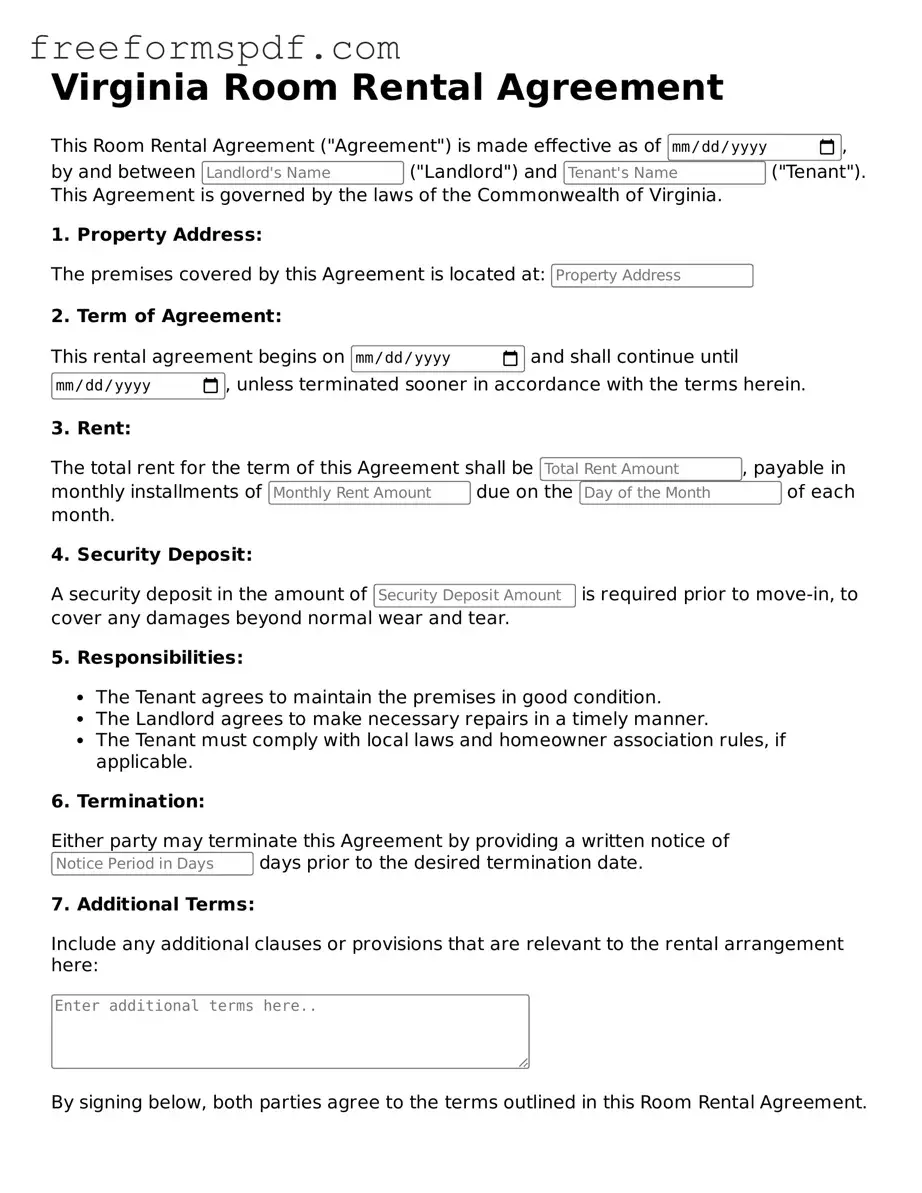Attorney-Verified Room Rental Agreement Document for Virginia State
Common mistakes
When completing the Virginia Room Rental Agreement form, individuals may encounter several common mistakes. Awareness of these errors can help ensure that the agreement is filled out correctly and effectively. Below is a list of four frequent mistakes:
-
Incomplete Information: Failing to provide all required personal details can lead to confusion or delays. This includes missing names, addresses, or contact information.
-
Incorrect Dates: Entering the wrong rental start or end dates may result in misunderstandings regarding the rental period. Always double-check the dates for accuracy.
-
Neglecting Signatures: Omitting signatures from either party can invalidate the agreement. Ensure that all required signatures are present before submitting the form.
-
Ignoring Terms and Conditions: Not reading or understanding the terms outlined in the agreement can lead to disputes later. It is crucial to review the entire document carefully.
By being mindful of these common mistakes, individuals can facilitate a smoother rental process and avoid potential complications.
Learn More on This Form
-
What is a Virginia Room Rental Agreement?
A Virginia Room Rental Agreement is a legal document that outlines the terms and conditions under which a room or property is rented. This agreement serves to protect both the landlord and the tenant by clearly defining the responsibilities and rights of each party. It typically includes details such as the rental amount, duration of the lease, security deposit requirements, and rules regarding the use of the property.
-
What should be included in a Room Rental Agreement?
A comprehensive Room Rental Agreement should include several key elements:
- The names and contact information of the landlord and tenant.
- The address of the rental property.
- The rental amount and payment due dates.
- The duration of the rental period, including start and end dates.
- Details regarding security deposits and any applicable fees.
- Rules regarding pets, smoking, and maintenance responsibilities.
- Termination conditions and procedures for ending the agreement.
Including these elements helps prevent misunderstandings and provides a clear framework for the rental relationship.
-
Is a Room Rental Agreement legally binding?
Yes, a Room Rental Agreement is legally binding once both parties have signed it. This means that both the landlord and tenant are obligated to adhere to the terms outlined in the agreement. If either party fails to comply, the other may have legal grounds to seek remedies, which could include financial compensation or eviction proceedings. It’s crucial for both parties to read and understand the agreement before signing.
-
Can a Room Rental Agreement be modified?
Yes, a Room Rental Agreement can be modified, but any changes must be agreed upon by both the landlord and tenant. It’s advisable to document any modifications in writing and have both parties sign the updated agreement. This ensures that all parties are aware of and consent to the new terms, thereby avoiding potential disputes in the future.
-
What happens if a tenant breaks the terms of the agreement?
If a tenant breaks the terms of the Room Rental Agreement, the landlord has several options. Depending on the severity of the violation, the landlord may choose to issue a warning, seek a resolution, or initiate eviction proceedings. Common violations include late rent payments, unauthorized pets, or damage to the property. It’s important for landlords to follow the legal process for eviction to avoid potential legal issues.
Misconceptions
Understanding the Virginia Room Rental Agreement form can be tricky. Here are eight common misconceptions that people often have:
-
It’s only for long-term rentals.
Many believe that this agreement is only suitable for long-term rentals. In reality, it can be used for both short-term and long-term arrangements.
-
All rental agreements are the same.
Some think that all rental agreements are identical. However, each state has its own laws and requirements, making the Virginia Room Rental Agreement unique.
-
Verbal agreements are sufficient.
Many assume that a verbal agreement is enough. A written agreement provides clarity and legal protection for both parties, making it essential.
-
Only landlords need to sign.
Some believe that only the landlord’s signature is necessary. In fact, both the landlord and tenant must sign the agreement for it to be valid.
-
Security deposits are optional.
It’s a common myth that security deposits are optional. In many cases, landlords require them to protect against damages or unpaid rent.
-
Once signed, the agreement can’t be changed.
People often think that a signed agreement is set in stone. Modifications can be made, but both parties must agree to any changes in writing.
-
Only the landlord can enforce the agreement.
Many believe that only landlords have the power to enforce the terms. Tenants also have rights and can take action if the landlord violates the agreement.
-
It’s unnecessary if you know the landlord.
Some think that knowing the landlord makes a formal agreement unnecessary. Regardless of familiarity, a written agreement is always advisable for legal protection.
Some Other Room Rental Agreement State Templates
Room Rental Contract Template Free - States the total rental fee and any additional charges.
To properly navigate the eviction process, landlords should utilize the New York Notice to Quit form, which serves as an important legal document. For those seeking an effective template, resources like NY Templates can provide the necessary guidance and format, ensuring all critical details are addressed appropriately for both parties involved in the rental agreement.
Renting Room Lease Agreement - Includes provisions for amendments to the contract.
Shared Housing Agreement - Requires written consent for changes to the agreement.
